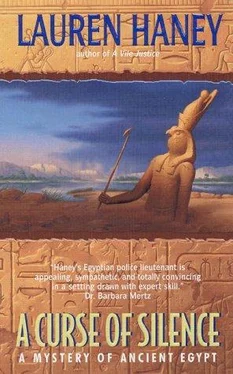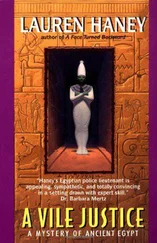Lauren Haney - Curse of Silence
Здесь есть возможность читать онлайн «Lauren Haney - Curse of Silence» весь текст электронной книги совершенно бесплатно (целиком полную версию без сокращений). В некоторых случаях можно слушать аудио, скачать через торрент в формате fb2 и присутствует краткое содержание. Жанр: Исторический детектив, на английском языке. Описание произведения, (предисловие) а так же отзывы посетителей доступны на портале библиотеки ЛибКат.
- Название:Curse of Silence
- Автор:
- Жанр:
- Год:неизвестен
- ISBN:нет данных
- Рейтинг книги:3 / 5. Голосов: 1
-
Избранное:Добавить в избранное
- Отзывы:
-
Ваша оценка:
- 60
- 1
- 2
- 3
- 4
- 5
Curse of Silence: краткое содержание, описание и аннотация
Предлагаем к чтению аннотацию, описание, краткое содержание или предисловие (зависит от того, что написал сам автор книги «Curse of Silence»). Если вы не нашли необходимую информацию о книге — напишите в комментариях, мы постараемся отыскать её.
Curse of Silence — читать онлайн бесплатно полную книгу (весь текст) целиком
Ниже представлен текст книги, разбитый по страницам. Система сохранения места последней прочитанной страницы, позволяет с удобством читать онлайн бесплатно книгу «Curse of Silence», без необходимости каждый раз заново искать на чём Вы остановились. Поставьте закладку, и сможете в любой момент перейти на страницу, на которой закончили чтение.
Интервал:
Закладка:
Bak looked ahead at the mudbrick walls of Kor. Subsid iary to Buhen, the fortress was used as a staging post for caravans and as a place where military units traveling through the area could camp out and rest in safety. He came often to Kor, summoned by scribes charged with collecting tolls or soldiers who maintained order. Never before had he noticed how shabby the structure looked. The towered walls had reverted to the natural deep brown of the mud bricks, mottled by patches of white plaster in spots shel tered from the wind and blowing sand. The battlements were eroded, with time softening their once crisp, sharp edges. Several of the projecting towers had been rebuilt, but many were cracked and a few leaned at odd angles.
Kor was ideal for its purpose but what, Bak wondered, would Amonked think of it? What would a man fresh from the capital, with its well-maintained and brightly painted buildings, think of this dilapidated old fortress?
“The lord Amon must be watching from afar, made speechless by his storekeeper’s excess!” This from Nebwa, looking down from the battlements, watching a long line of sailors file into the harbor-side gate, burdened with sleep ing pallets, portable furniture, and innumerable woven reed chests.
Hands on the parapet, weight resting on his arms, Bak looked down upon the fortress’s interior. He felt awe and disgust in equal measure. Royal envoys often traveled south with showy gifts for Kushite royalty, but nothing like this.
“Could Amonked not leave anything behind?”
Nebwa crossed the walkway to stand beside him. He made no comment. The scene below spoke for itself. The space within the walled rectangle, usually quiet and scantly occupied, teemed with life. Donkeys milled around an area fenced off at the far end, braying, raising a cloud of dust.
Vast piles of fodder and sacks and baskets and jars stood in and among buildings whose roofs had long ago fallen and whose walls had collapsed. Additional supplies were being piled with the rest by men unloading the last string of donkeys to arrive from Buhen.
A white linen pavilion stood in the center of an open stretch of sand normally used for the formation or disband ing of caravans, and several of Amonked’s guards were erecting small tents beside the larger structure for the in spector’s party. The remaining guards were setting up nearby a more casual camp for themselves, scurrying around like ants but not as well organized. Nebwa’s arch ers, more efficient by far, had settled down near a cluster of intact buildings, their preparations for the night com plete. The barracks and four houses, all remodeled over the past few years to shelter the scribes and troops posted at Kor, provided an oasis of quiet among the bustle.
Bak eyed the pavilion, exasperated. “Did he not talk to any of our sovereign’s envoys before he left the capital?
They surely would’ve told him that less is best when trav eling through this barren land.”
“He didn’t bring his wife or as many servants as I’d have expected.” Nebwa’s tone grew wry. “Maybe he thinks he’s sacrificed enough in the name of common sense.”
Bak spotted Amonked and Lieutenant Horhotep walking along the base of the far wall, escorted by the young lieu tenant who commanded the post. “The inspection should be finished soon.”
“Amonked will have heard we’re here. We’d better go see him.”
They walked to the towered gate, where zigzagging lad ders would take them to ground level. There they stopped for one last look from on high.
“Seshu must be tearing out his hair,” Nebwa said.
“Can you blame him?”
Nebwa grinned at his friend. “You grew to manhood near
Waset. I’d think you’d be accustomed to the flaunting of wealth and power.”
What Bak was accustomed to was Nebwa’s teasing, which in this case he chose to ignore. “There’s a critical difference between the frontier and the capital, a difference
Amonked has failed to see. No risk is involved in the land of Kemet. No danger. No desert tribesmen who’ll be tempted by what, to them, are vast riches.”
Bak and Nebwa wove a path through the half-erected tents, their goal Amonked, who stood with Horhotep out side the pavilion, watching the officer in charge of Kor hurry toward the barracks like a man escaping some dire fate. Red and white pennants fluttered in the breeze from atop the center post, and a tall, leggy white dog, a breed used by the nobility for racing and hunting, lay stretched out in the sun near the entrance. Neither the inspector nor his military adviser noticed the approaching officers.
“This fortress is an abomination,” they heard Horhotep say, “an insult to our sovereign. Peasants could make better use of it, crushing the bricks and spreading them across their fields as fertilizer.”
“The gods made a poor choice,” Bak murmured, “taking
Baket-Amon’s life and sparing this one.”
“A large number of caravans seek shelter here each year.” Amonked glanced around, as if trying to imagine the space during normal usage. “I must look at the fortresses upriver before making a firm decision, but Kor may have some value. If another quay were added, for instance…”
“No.”
Amonked gave his military adviser a sharp look, dis pleased, Bak suspected, by so curt a rejection of his thought.
Unaware, Horhotep looked toward the desert-facing gate, openly disdainful. “To be fully functional, the walls would have to be rebuilt from the ground up, as would the build ings. Since Kor is used for shelter, not defense, the gain wouldn’t be worth the cost.” He swung around, saw Bak and Nebwa, frowned. “What’re you two doing here? Did not Amonked make it clear he wants no interference from
Buhen?”
Nebwa’s countenance darkened, he looked about to spit out a barbed retort-at the very least.
Bak, no less angry at the affront, squeezed his friend’s shoulder, curbing him, and stepped forward. He spoke to
Amonked, paying no heed to the military adviser. “We’ve come on an urgent errand, sir.” He displayed the scroll
Thuty had prepared. “We must speak with you.”
The inspector could not miss the gravity on Bak’s face.
He swung around and raised the cloth that covered the pa vilion’s entryway. “Very well. You may come in.”
Bak gave Horhotep a pointed look. “I see no reason to trouble the lieutenant at the moment.”
If Amonked noticed the flush of anger on his adviser’s face, he chose to overlook it. “Go to our ship, Horhotep.
See that the vessel’s been cleared of our possessions and send it back to Buhen.”
Horhotep flung Bak a look of impotent fury, pivoted on his heel, and strode away. Bak could understand the advi ser’s anger; he would be equally upset if Thuty sent him on so menial an errand. He wasted no time on sympathy, thinking instead of the abrupt dismissal, which offered un expected reassurance. So far, it seemed, Amonked was holding his adviser at sufficient distance that the man’s in fluence might be contained within reasonable bounds. Or was the inspector simply retaliating for the earlier rejection of his thought?
The pavilion was a haven of comfort in the midst of frontier austerity. A gentle breeze ruffled the cloth at the entrance and filtered light seeped through the linen roof and walls. Embroidered linen hangings divided the space, al lowing for privacy at the back. Thick mats covered the floor, soft linen pallets and portable stools provided seating, and small tables and woven reed chests offered surfaces for game pieces, drinking bowls, and scrolls. A god’s shrine stood against one wall, draped with a cloth to give privacy to the deity inside-the lord Amon, Bak assumed. Furniture and hangings were far more abundant and elegant than any available to the officers of Buhen. Small wonder that Seshu was upset. How many donkeys would be required to trans port the pavilion and its accouterments?
Читать дальшеИнтервал:
Закладка:
Похожие книги на «Curse of Silence»
Представляем Вашему вниманию похожие книги на «Curse of Silence» списком для выбора. Мы отобрали схожую по названию и смыслу литературу в надежде предоставить читателям больше вариантов отыскать новые, интересные, ещё непрочитанные произведения.
Обсуждение, отзывы о книге «Curse of Silence» и просто собственные мнения читателей. Оставьте ваши комментарии, напишите, что Вы думаете о произведении, его смысле или главных героях. Укажите что конкретно понравилось, а что нет, и почему Вы так считаете.












